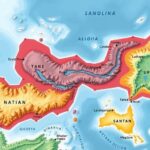U.S. Diplomat Warns Venezuela: Consequences for Aggressive Claims Against Guyana
Marco Rubio warned Venezuela of dire consequences if it continues aggressive claims against Guyana’s oil-rich Essequibo region. He emphasized military support from the U.S. to safeguard Guyana’s sovereignty. President Irfaan Ali welcomed the U.S. commitment, while ExxonMobil anticipates significant oil production growth. Venezuelan claims face international rejection despite growing tensions in the region.
On Thursday, U.S. diplomat Marco Rubio issued a strong warning to Venezuela concerning its aggressive claims against oil-rich Guyana. He stated explicitly that any military adventurism would prompt significant consequences from the U.S. He emphasized the nation’s commitment to protect Guyana, indicating, “There will be consequences for aggressive action” as he addressed media at a joint press conference.
Rubio further noted, in a direct address to concerns over Venezuela potentially attacking ExxonMobil’s operations in Guyana, that such an act would lead to a disastrous situation for Venezuela. He stated, “It would be a very bad day — a very bad week for them,” reinforcing the U.S. stance on regional security while garnering applause from Guyanese officials present.
Although he refrained from detailing specific military responses, Rubio highlighted the strategic capabilities of the U.S. Navy, remarking, “We have a big navy, and it can get almost anywhere.” This statement came during the signing of an agreement aimed at enhancing security cooperation between the U.S. and Guyana, which includes joint maritime patrols.
Guyanese President Irfaan Ali welcomed Rubio’s address, calling Venezuela’s territorial claims “illegitimate” and expressing gratitude for U.S. support in safeguarding Guyana’s sovereignty. Mauricio Claver-Carone, the U.S. special envoy on Latin America, noted the vision for a strong “binding” security relationship with Guyana akin to that in the Gulf region, where the U.S. maintains military presence to ensure security for smaller states against larger adversaries.
Historically, Guyana has explored the possibility of joining the United States, reflecting its long-standing aspirations. While such formal accession to the U.S. remains unlikely, the Trump administration is eager to expand U.S. influence in the Western Hemisphere, risking traditional alliances. This expansionist sentiment has seen proposals such as acquiring Greenland and regaining control over the Panama Canal.
As ExxonMobil dominates Guyana’s burgeoning oil industry, rival nations such as China are advancing their interests through infrastructure projects. Recently, Guyana reported a Venezuelan military vessel’s incursion into its waters, which Venezuela denied, though the offer for a diplomatic meeting was rebuffed by Ali. Venezuela’s parliament also moved to claim Guyana’s Essequibo as its 24th state, a declaration that has been rejected internationally, while Guyana asserts that the border was established by an arbitration panel in 1899.
In the backdrop of increasing oil production, the Trump administration prioritizes expanding this sector for both economic and security reasons, contrasting former President Joe Biden’s focus on renewable energy. As production in Guyana rapidly escalates, ExxonMobil predicts reaching 1.3 million barrels of oil per day by the decade’s end, outpacing Venezuela’s declining output due to years of mismanagement and U.S. sanctions. The administration has also revoked exemptions for companies like Chevron that wish to operate in Venezuela, amplifying the pressure on the Maduro regime.
In summary, Marco Rubio’s statements underscore the United States’ strong position regarding Venezuela’s territorial claims against Guyana and its commitment to the region’s security. The U.S. signals readiness to provide military support if necessary, while Guyana seeks to maintain its sovereignty amidst escalating tensions. As ExxonMobil leads the oil production boom in Guyana, the geopolitical stakes in Latin America are evidently rising, highlighting shifting alliances and strategic interests in the region.
Original Source: www.ndtv.com








Post Comment